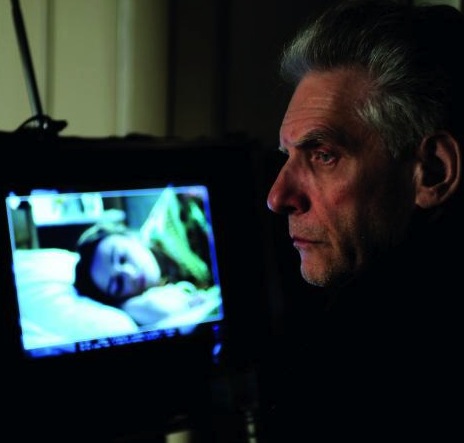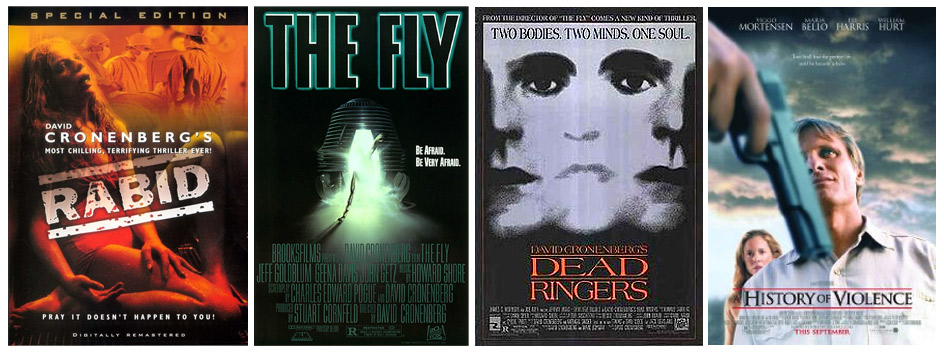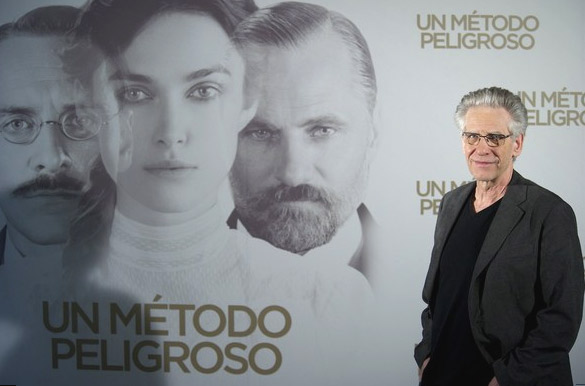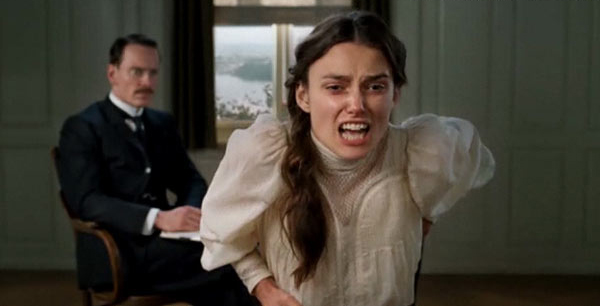David Cronenberg on A Dangerous Method & the "Parallel Universe" of Oscar
 Thursday, December 1, 2011 at 12:44PM
Thursday, December 1, 2011 at 12:44PM  Cronenberg hard at work on "A Dangerous Method"I met the great filmmaker David Cronenberg one morning this fall shortly before a screening of his latest work at the New York Film Festival. His new film A Dangerous Method, which just opened and will be expanding throughout the month in theaters, is a historical drama about the birth of psychoanalysis. In the film Sigmund Freud (Viggo Mortensen) and his protege Carl Jung (Michael Fassbender) are torn apart over idealogical differences and Jung's treatment of a young woman named Sabina (Keira Knightley).
Cronenberg hard at work on "A Dangerous Method"I met the great filmmaker David Cronenberg one morning this fall shortly before a screening of his latest work at the New York Film Festival. His new film A Dangerous Method, which just opened and will be expanding throughout the month in theaters, is a historical drama about the birth of psychoanalysis. In the film Sigmund Freud (Viggo Mortensen) and his protege Carl Jung (Michael Fassbender) are torn apart over idealogical differences and Jung's treatment of a young woman named Sabina (Keira Knightley).
Cronenberg in person was talkative, articulate and fascinating. He was even good natured about the sordid topic of Oscar (incredibly the reknowned auteur has never been nominated for an Oscar, a Golden Globe or even a DGA prize!).
His ease with conversation might surprise people who only know him through his often unsettling films. The night before our interview I'd been at a party and when I casually mentioned I'd be interviewing Cronenberg the next day I heard the strangest funniest responses: "Don't get in a car with him!" "Don't let him touch your portals!" and so on. Other amusing warnings followed as if he were a frightening character from his movies.
I relayed this to Cronenberg as icebreaker when we sat down...
Nathaniel: Do you find that people regularly have odd conceptions about you based on your films?
DAVID CRONENBERG: Well, you know, I haven't done horror films for a long time so it's strange that it's sticky. I've talked about this before but Marty Scorsese told me he was terrified to meet me -- we did meet and became very good friends many years ago -- but he said he was terrified and then shocked to see that I looked like a Beverly Hills gynecologist. And I said 'You were afraid to meet me? You're the guy who made Taxi Driver?!'
 a small sampling of his often deeply troubling films
a small sampling of his often deeply troubling films
It was a long time ago. But he had seen Shivers and Rabid and maybe The Brood and he found them incredibly overwhelming and terrifying. He of all people should know and I suppose if Marty could make the same mistake...
The relationship of an artist to his art is a complex one. It's not one to one. It's not like you make romantic comedies therefore you are romantic and fun. On the contrary we know that most comedians are really nastily, hostile, spiteful vindictive people.
Nathaniel: Does your work ever scare you then, when you see it back?
CRONENBERG: I don't normally watch it. I can't watch my movies as though they're movies. They're documentaries of what I was doing that day. I'm the last person to be able to tell you objectively what my movies do or don't do.
Nathaniel: As an auteur you obviously have had recurring thematic elements Do you think about your past work when you're working on something new?
CRONENBERG: No. I completely don't. That's why if someone should say, it has happened, that A Dangerous Method doesn't feel like a Cronenberg film. I don't know what they're talking about. I mean, I know what the cliches are. But to me, they don't realize that the first movie I made was about a psychiatrist and his patient. It was a short, my first film. So for me this is business as usual. To me that just reveals their ignorance. I'm not saying that in a vindictive way but it just means they don't really know my work or understand it. That's the way I feel.
Nathaniel: It's actually very much like your work in terms of the concerns. You've done a lot of films that had psycho-analytic elements. Did you ever worry that this was maybe too on the nose, given that? Like you're going back to the womb or the source of it all.

CRONENBERG: No, No. It's exciting to do that!
[MORE AFTER THE JUMP: including his collaboration with Viggo, awards season lottery tickets, and the modern trend of directors tinkering with their old movies.]
CRONENBERG: I think when I read Christopher Hampton's play it was the first time I thought 'Well, I've probably always wanted to do something about Freud and psychoanalysis directly.' But to say that isn't to say much because it's such a long complex life with so many people and things in it and there's no structure there. I read the play and here's this beautiful structure that could be very illuminating, and it introduced me to Sabina [Keira Knightley] who I had never known about.
 "It excited me."So here was a beautiful structure that would then allow me -- in fact force me -- to do wonderful research into the period which is intriguing and really crucial to the heart of Europe before World War I. And psycho analysis? Fantastic. It was really exciting to me.
"It excited me."So here was a beautiful structure that would then allow me -- in fact force me -- to do wonderful research into the period which is intriguing and really crucial to the heart of Europe before World War I. And psycho analysis? Fantastic. It was really exciting to me.
But I don't think of my other movies at all. Because each movie is a unique creature. I've often said this but I give the movie what it wants. I listen to the movie. Eventually it tells you what it wants in terms of style, in terms of what lens you use, in terms of lighting, in terms of everything. I don't, for example, do storyboards. I don't want to impose a schematic thing on something that should be organic and alive. I want the movie to emerge through the work I do with my collaborators and through the subject. It will gradually organically emerge and it will speak to me. It'll tell me 'No, this is the wrong lens. You used this on the other movie. This is not the one.' Even as specifically as that.
Nathaniel: What do you make of this recent trend among a lot of your peers where they revisit old film and tinker for new versions. It doesn't sound like something that would interest you.
CRONENBERG: It doesn't interest me at all. To me, I think there's an insecurity and a fear of maybe even humiliation that in, you know, The Exorcist, you can see the strings and you can remove those in the DVD release and so on. No, I think this is a historical artifact. It's like discovering a Greek sculpture digging in an archeological dig. It's wonderful to let it be what it is. To see what it was and to feel what it was at the time to make a movie in the Seventies, let's say.
Dead Ringers was pre CG. We did pretty well doing optical splits. Guys who do twin movies still look at it. But the technology makes it easier now. I wouldn't mess with it. My feeling is that it's of its time and let it have -- I don't even think of them as flaws -- its textures that were part of the time.
I totally agree. I like it to be what it was so I can look back. I think they're great for research into time periods -- contemporary films I mean.
Yeah, Absolutely. I'm enough of an academic, you know, to feel that that's an important thing to be able to do.
A lot of your work feels very prescient in a way. Like, implanting things in your body. People get more cyborg like all the time. I've noticed in a lot of old science fiction films that nobody predicted touch screen technology which is all anybody is doing now. But in your work you have great images like people actually going into the screen. Do you ever feel proprietary about these things afterwards?
 CRONENBERG: No. Well... you can either say they're influenced by you or ripping you off. It's the same basic thing. Even with Alien. My movie Shivers I have a parasite that lives in you and burns its way out of your body and jumps on your face and and jumps on your face and goes down your throat. I know Dan O'Bannon knew my movie. In a case like that you wouldn't mind a little credit for it. But beyond that, if you are influential -- and I've had many young filmmakers say that I was a big influence and sometimes their movies do remind me of my old movies -- you take it as a compliment. You obviously touched a nerve. It's nice to have people be aware of that. But beyond that it's inevitable; things become communal understandings, let's say. The whole parasite thing. I mean there are movies called Parasite. But I did it first but, you know, whatever.
CRONENBERG: No. Well... you can either say they're influenced by you or ripping you off. It's the same basic thing. Even with Alien. My movie Shivers I have a parasite that lives in you and burns its way out of your body and jumps on your face and and jumps on your face and goes down your throat. I know Dan O'Bannon knew my movie. In a case like that you wouldn't mind a little credit for it. But beyond that, if you are influential -- and I've had many young filmmakers say that I was a big influence and sometimes their movies do remind me of my old movies -- you take it as a compliment. You obviously touched a nerve. It's nice to have people be aware of that. But beyond that it's inevitable; things become communal understandings, let's say. The whole parasite thing. I mean there are movies called Parasite. But I did it first but, you know, whatever.
In terms of prescience, hard core science fiction, Arthur C Clarke really liked to say that he anticipated satellite communication, circling the earth and stuff like that. He wants people to know that. But that was kind of a macho element of sci-fi to be predictive, to be accurate. Whereas my movies I was never really worried about that. I was just reacting to the zeitgeist. My antennae were sensitive and I was picking up stuff. The purpose was never to predict technology let's say. That wasn't the purpose. If it happens, it's fine.
When other directors touch on themes you've worked with... for example, you did the sexual zombie thing way back in the seventies and Bruce LaBruce made two sex zombie movies recently. And Pedro Almodóvar's The Skin I Live In you could call it a "body horror" drama. Are you interested in seeing other directors work with topics and themes you've handled?
Not particularly. There was a time when I was making horror films that I was very interested in the genre but it more had to do with learning how to make movies. I never went to film school so I'm self taught. It wasn't obsession with the genre so much as technological interest. What can you do with effects? What is done especially in low budget? It was more of that. If a movie is great, whatever genre it is, and I feel I need to see it then I will see it. I don't feel, though, the need to see every movie and I don't feel the need to see every movie within a particular genre. That doesn't interest me.
Seeing what Almodóvar would do with that kind of thing, that would interest me because it's not his usual thing - seeing his sensibility fused with that would be interesting. I would like to see that movie. But to see every horror film made? No.
People get really hung up on the grotesque within your movie but for me, as someone who is not interested in horror per se, the excitement in your work is the abundance of character psychology and multiple sided characters. Like Tom Stall in A History of Violence (2005). And I love Miranda Richardson in Spider (2002). Her work there is so fascinating.
I agree with you.
 Miranda Richardson, Oscar-worthy in Spider (2002)
Miranda Richardson, Oscar-worthy in Spider (2002)
Do you find people "unknowable? Is that something you're trying to portray in your films?
No. I just find them complex and intriguing and always a work in progress. One of the things about Spider is "What is an identity?" How do you fix one? How do you invent one? How do you create one? And the idea that it takes incredible energy every day to put yourself together. You wake up in the morning and you have to create yourself every day in your context.
Right, right.
When that will breaks down, as in a schizophrenic, or when organically there's a problem and you can't put yourself together, what happens then? As a person comes apart it's dramatically interesting but it also gives you a chance to see what the nature of an identity or a personality is. All of those things are really intriguing.
It is a body thing. For me, I'm an atheist and I don't believe in the afterlife. The body is the first fact of human existence. That includes the creation of ourselves. It is a physical thing. As a director you are photographing bodies. That's what you do. You photograph the human face but also the body language. I think as a filmmaker, particularly as a dramatist, you cannot ignore the human body. Working as a actor once or twice myself I became ferociously aware of how much of an actor is the body consciousness.
 "Punish me"
"Punish me"
As a director nobody cares what you look like. You can have a cold sore, you haven't shaved, it doesn't matter. If you can say 'action' and 'cut', you're a director. But an actor, your body has to be there. That is your instrument. I include the voice in the body of course. It's all of those things, in other words. That's what I deal with. So when it sometimes goes over to the bodily grotesque or the horror aspect, it's really just an inevitable offshoot, not the prime thing, but my approach to what humanness is.
I'm wondering about your approach to actors. Apart from Viggo Mortensen and Jeremy Irons you're not a filmmaker who always uses the same people. Do you get a sense ahead of time... do you know certain types of actors are going to be more stylistically appropriate for what you do.
Yeah, I'm drawn to certain kinds of actors. I like actors who are character actors who are somehow also leading actors, character actors as opoosed to stars who have a particular identity they don't want to deviate too far from. Real actors in other words. Some stars are real actors and some are not, some are just stars. So you have a sense. And I can definitely watch a movie and think the actor is a really good actor but have no interest in working with that person.
 Viggo Mortensen (Eastern Promises), one of only two actors to be nominated for Cronenberg's films
Viggo Mortensen (Eastern Promises), one of only two actors to be nominated for Cronenberg's films
There are no rules. Its all intuitive. It's all subjective. Casting is a black art. It's a very little known aspect of directing but it's hugely important but it's kind of invisible. People often ask me "did you choose this actor?" I say 'well yeah.' You're not a director if you don't. I guess in the old studio days but those days are long gone. So now, you're clawing your way trying to find actors who are great for the role, that you can afford, who will support your co-production if it's a co-production. That means their passport is important.
I never thought about that.
Of course you haven't. Viggo is not an American, he's a Dane. I could not have him in the movie if he were an American. Because it's a coproduction it has to be Europeans or Canadians. You could maybe get one American but... this is a consideration that a director and a producer has to deal with. It's the reality. You can't just pick and choose any person you want.
I mean The Dead Zone was interesting for me because I could use a lot of American actors. There was no Canadian money invested so I could suddenly work with a whole bunch of American actors in one movie that I couldn't before. All of these things factor in. It's a lot trickier than you might think.
Yeah, I don't think about the pay scales and nationalities.
Of course not. But if an actor is asking for $3 million and your budget is $3 million, you can't use him. [Laughter]
Viggo Mortensen. I always feel very grateful to directors who unlock what an actor always had in them in terms of a performative level. I really think he is one of our greatest screen actors but that wasn't abundantly clear until you started working with him.
That's nice to hear. Thank you.
So I really hope you keep working with him.
Oh, well, I love him of course.
Do you mind talking about the sordid topic of awards and Oscar?
Sure. Sure.
 Cronenberg and Viggo on the set of A Dangerous Method, their third collaboration
Cronenberg and Viggo on the set of A Dangerous Method, their third collaboration
I've noticed when people review your work -- this has happened several times -- they say "it's the culmination of his career!" Dead Ringers and Spider got that a lot. I'm sure it's happening with this one. I always feel like people are trying to move your work into the "lifetime achievement" realm?
[Amused] A scary realm!
Even actors within 'auteur films' who are great at stylizing themselves for the director's concerns, it seems like it's the least likely type to be honored. Do you find it frustrating?
No, not really. I've gotten enough awards. Viggo and I both say we've had enough attention to last a lifetime. Really. What we love is the work and doing it well.
The awards things puts you into a very weird competitive space. Certainly Viggo and I are as capable of being competitive as anybody else, but it's not the creative space, it's a whole other thing. It's a weird parallel universe. It has its own rules that have nothing to do with whether your work is really good or not. Part of it is a popularity contest, part of it is people's perception of you over time. You can't control it or shape it. It's almost like winning the lottery if you win an Oscar. Your number came up! Why? I don't know. Or it doesn't come up. You can analyze it to death. You're philosophical about it.
 And the other thing too is certainly the kind of movies I've been making, winning an Oscar doesn't really do anything for you. My name is enough to get a co-production happening. Not totally, I need actors. I get offers from studios. I don't really think it would functionally mean anything. People take it very seriously so it's hard not to because that becomes the reality. If five billion people get excited about the fact that you won an Oscar, it's hard to say it's not that significant. Would I love it? It'd be fun to win an Oscar.
And the other thing too is certainly the kind of movies I've been making, winning an Oscar doesn't really do anything for you. My name is enough to get a co-production happening. Not totally, I need actors. I get offers from studios. I don't really think it would functionally mean anything. People take it very seriously so it's hard not to because that becomes the reality. If five billion people get excited about the fact that you won an Oscar, it's hard to say it's not that significant. Would I love it? It'd be fun to win an Oscar.
You can let other people be incensed for you.
Exactly. Exactly [Laughter]. It's almost better.

Related Posts
A Dangerous Method review | Modern Maestros: David Cronenberg | Viggo Viggo Viggo Viggo Viggo (Eastern Promises) | Keira Knightley "Exteriority"



Reader Comments (12)
Great interview! Thanks for sharing with us.
Great interview! Made me want to revisit "A Dangerous Method".
This was great. You're a great interviewer. I don't know if others give you credit for that. Anyway, great questions and followups, a conversation. You were able to get some great responses from DC.
So when is the next scheduled Cronenberg interview? For Cosmopolis?
How long did you have to interview him? I could read this conversation all day long. He's very foreright about everything. Please make yourself available to Verhoeven before he dies!
/3rtfull -- i usually get 20 minutes (but some of that is introductions and such). Verhoeven would be awesome to talk to. any of the crazy directors would be.
Pausner & Steve - thank u
Joy -- i've been wanting to as well. I saw so many of this year's movie sin such a short time span at the NYFF that it kind of all gets blurry.
That was a brilliant interview. One of the best i've read this season.
Wonderful interview, really great.
It is always great to read good questions and intelligent answers so thank you. Altough I have to say I'm surprised you didn't ask him about Keira's performance. It's beyond risky!
I loved when he explains you the casting process in co-productions. In Europe they are quite common and usually very annoying because you get the feeling that a certain actor got the part just to cover the basics.
I really enjoyed A Dangerous Method. It is very Cronenberg but at the same time very Christopher Hampton. Sort of a Dangerous Liaisons with psychoanalysis! You know, the mind games, the one in charge loosing his power, the weaker getting stronger...
Great interview, great conversation, Nathaniel! I'll second everyone else on that. This is one of my favorites of your interviews so far - the weird thing is that I don't think that I've ever seen any of Cronenberg's films. this interview makes me want to correct that. (I'm not into horror - at all - so I'd probably start with A History of Violence, unless you recommend otherwise?)
And I love the comments you made about Viggo and about "unlocking what an actor has in them". I imagine you must be a breath of fresh air compared to a lot of the interviewers they have to sit with?
Lovely interview Nathaniel - must be great to meet so many interesting artists in recent years.
This blog is nice and amazing. I love your post! It's also nice to see someone who does a lot of research and has a great knack for ting, which is pretty rare from bloggers these days.
Thanks!
music
Lovely, original questions. Fantastic interview.